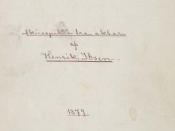In the short story, "The Chrysanthemums", by John Steinbeck, symbolism is used many times to characterize Elisa Allen and describe her role. The image of a fence is used to describe the confinement of the farmer's wife to the house and farm. "Elisa stood in front of her wire fence watching the slow progress of the caravan". (p. 90). The fence kept Elisa trapped into her life as a farm wife, and outside of the farm she had no life of her own. The plant represents Elisa's one pride and talent of being able to grow things. "You watch your fingers work. They do it themselves. They never make a mistake. They're with the plant. Do you see? Your fingers and the plant." (p. 70). Elisa is very good at growing plants and flowers because of her "planting hands", and it is the one thing she has complete control over.
The fights are a symbol of something that respectable women aren't supposed to take an interest in. "'Do any women ever go to the fights?' she said. 'Oh, sure, some. What's the matter Elisa? Do you want to go? I don't think you'd like it but I'll take you if you really want to go.'" (p. 120) Henry never even considered that his wife might want to go to the fights because, being a woman, she wasn't expected to like them. All of these symbols are very meaningful to Elisa and represent her life as a housewife.
In this story, the portrayal of the "women's world" is restricted to the home and farm, and the women are not expected to be concerned with anything outside of their homes, such as fights. Elisa is not expected to be anything other than a farmer's wife, and her greatest accomplishment is growing chrysanthemums, however she is interested in the outside world but cannot take part in it. In "A Doll's House", there is a very similar situation concerning the wife and mother who shouldn't be concerned with serious matters and she was always sheltered from them. The main character is expected to only be concerned about the home and children, yet she went against the Victorian society and did something that was not proper by forging her father's signature, even to save her husband's life. Another literary example of a woman out stepping her role is "Antigone". In this play, Antigone mourns her brother although the king forbid it. She went against his wishes and did what she felt was the right thing. In all of these works, the women are strong characters who overcome the society ruled by men to understand that they are also people, and just as important as a man.





